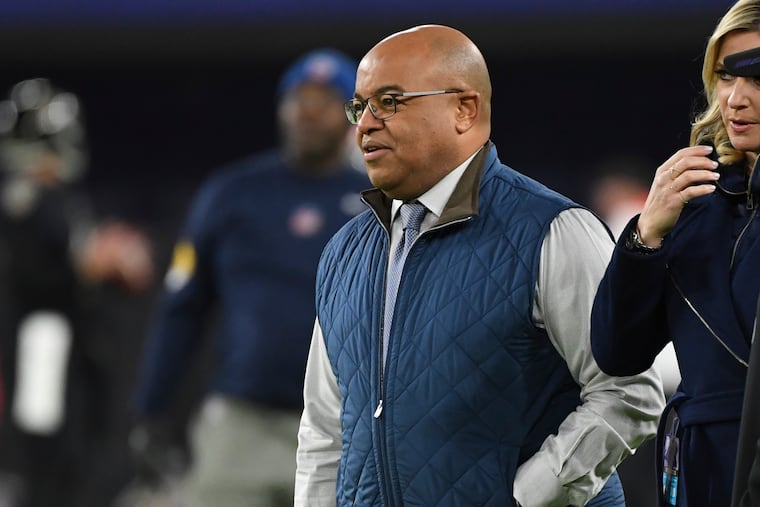NBC Olympics host Mike Tirico is glad he can freely call out China’s alleged human rights abuses
“We got the go-ahead to tackle these issues and be straightforward and honest with our viewers,” Tirico said of his remarks on China's alleged abuses of Uyghur Muslims that have been called genocide.

NBC Olympics host Mike Tirico drew widespread praise for his forthright commentary at the start of the Winter Games on accusations that China is committing genocide upon Muslim Uyghurs in the country’s northwestern Xingjiang region.
Now back on U.S. soil as he continues hosting Olympics coverage and prepares to host Super Bowl coverage on Sunday, Tirico took some time Thursday to reflect on those remarks and how empowered he was by NBC to make them.
“We got the go-ahead to tackle these issues and be straightforward and honest with our viewers,” he said on a conference call with reporters and some of his NBC colleagues. “We want to be honest with them, and hopefully we did the right thing by them.”
While hosting the first two days of NBC’s Olympics coverage, Tirico used the word “genocide” multiple times. He also criticized Chinese attacks on pro-democracy protesters in Hong Kong, and made a reference to “sportswashing” — a term for nations that build public reputations through sports in order to move the spotlight from human rights abuses.
» READ MORE: At the Winter Olympics, NBC’s Mike Tirico dives into controversial issues
Tirico was joined in Beijing for those broadcasts, including at the stadium where the Opening Ceremony took place, by the Bloomberg New Economy Forum’s Andrew Browne and Yale University Professor Jing Tsu.
NBC News anchor Savannah Guthrie was also on the Opening Ceremony broadcast from NBC Sports’ studios in Stamford, Conn. That’s where Tirico has been since leaving Beijing on Tuesday. He will soon head to Los Angeles for the Super Bowl, then return to Connecticut for the rest of the Olympics.
“We hopefully addressed the issues that matter,” Tirico said. “You know, you’ll never satisfy everyone, especially in our country in 2022. So, people may say, ‘Oh, you talk too much about politics. Oh, I want a little bit more of this, a little bit more of that.’ That’s what the opening ceremony is. The opening ceremony is always this incredible mix of politics, and what the athletes are wearing, and celebration and party. It’s really this very unique catchall event, and we try to bring that to folks.”
Tirico praised Joe Gesue, NBC Sports’ senior vice president of Olympics production, and Ron Vaccaro, NBC Sports’ vice president of editorial, for their help in getting everyone ready.
“Tireless work that we all did to make sure that we did what we thought was the right thing to do to set the table for American viewers,” Tirico said. “And I hope that the conversation inspired people to spend more time on international relations. We live in a very complex and amazing country, but man, there’s a really interesting world out there, and a very interesting time — and the Olympics helped open my eyes and educated me.”
Tirico noted that while many viewers know he’s an alumnus of Syracuse’s famed journalism school, he didn’t just study broadcasting in college. He had a double-major with that and political science.
“You can ask any of our NBC News colleagues: when our paths intersect, I wear them out talking politics and all that is about international relations in our world,” he said. “So this was something that’s of deep interest to me.”
» READ MORE: More of The Inquirer's Olympics coverage
Solomon, who gave one of the ultimate green lights for the coverage to take the tone it did, also shared her view.
“I thought it was an extraordinary moment, this nexus of sports and international relations,” she said. “Going in we promised ourselves, and we thought it was essential for the viewers, to provide perspective on China’s complicated relationship with the rest of the world. And it was really essential to set the stage for these Games during that ceremony, and we really accomplished that, and we’re incredibly satisfied with how we pulled it off.”
One of the most controversial moments came when Dinigeer Yilamujiang, a Chinese Uyghur cross-country skier, was unveiled as one of the lighters of the Olympic cauldron.
“Those are the people from the region in northwest China that has attracted so much attention in the conversation of human rights, and that ethnic minority,” Tirico said on NBC’s broadcast. “Comments from the United States government among others of genocide being committed against the Uyghurs. So a very significant moment here.”
Guthrie followed that by calling the selection of Dinigeeer “quite provocative” and “an in-your-face response to those western nations, including the U.S., who have called this Chinese treatment of that group genocide, and diplomatically boycotted these games.”
Solomon said Tirico and Guthrie “did an extraordinary job of presenting that moment,” and that “it was an important night for NBC Sports and NBC Universal.”